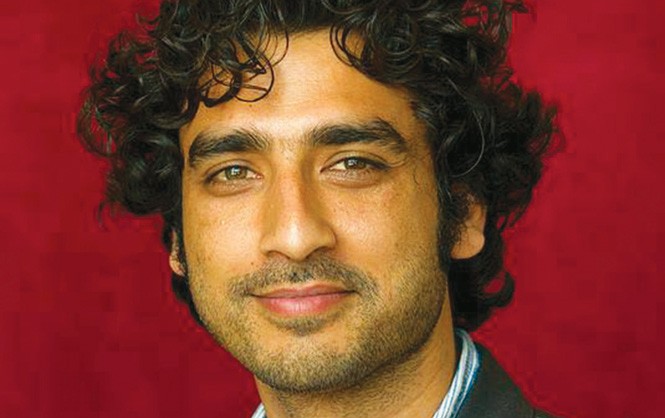
Interview of Feroz Rather

Feroz Rather is currently a doctoral student of Creative Writing at Florida State University and his work has appeared in The Millions, The Rumpus, The Southeast Review, Caravan, Warscapes, Berfrois, and Himal. His most recent essay, ‘Poet in Srinagar’, appeared in the anthology Mad Heart, Be Brave: On the Poetry of Agha Shahid Ali.
Here, in this interview conducted on email, he talks about his first book The Night of Broken Glass.
The News on Sunday: How easy or difficult is it to write fiction about a region that is ravaged by violence of this kind. I mean where all real life stories are so telling, what is left for the imagination?
Feroz Rather: I like the way you are framing the question. The real is so intense and shocking in Kashmir, a mere narrative rendering of it is going to sound exaggerated and make-believe, especially to those who are at a comfortable distance from the violence and do not want to see. As a writer though once I’d resolved to write the stories, though it was challenging and painful, there was no stopping or looking back. I was replicating what I’d witnessed closely but I wanted to keep the integrity that is necessary to impose an aesthetic form over the subject.
TNS: What does Kashmir mean to you when you write? Is it a fiction writer’s way to come to terms with reality? Do you also foresee this fiction as serving a larger purpose, of letting the world know what’s happening and doing something to change things?
FR: At one level, Kashmir is merely the setting. But at another level, the place flows into the truth of my world-view, my past, my memories and childhood experiences. In The Night of Broken Glass, this becomes relevant at the beginning of ‘The Souvenir’ when the young narrator thinks about such big things like mortality and afterworld while remembering his father quoting from the Qur’an.
The danger with conflict of this kind is that it numbs the power to create and contemplate. Fiction thus becomes a space where one contemplates consciously, as though the time marred and crippled with the killings, has been suspended and qualitatively altered by the writer.
Writers are drawn to drama before they start their crusades of political correction. I will however like it if there is a meaningful conversation around the book about what has happened and what is happening in Kashmir. The people of Kashmir are the victims of a certain political apathy, of a brutal kind, of the surrounding nation states.
TNS: The Night of Broken Glass reads like stories, some of which are interconnected through common characters while others like Safir and Maryam do not return in the later part of the novel. What was the writing process like and did you always imagine the end product to be like this?
FR: The writing process was thrilling as well as traumatic. The subject was hard to deal with but brought a sort of saddening joy whenever I felt I was in control of the narrative. At times, I tried to use a quiet, restrained tone (‘The Old Man in The Cottage’). At other times, quite the opposite (‘The Miscreants’). At times I used the third person omniscient (‘The Pheran’) and at times I went into the first-person singular (‘The Boss’). The subject itself demanded this somewhat chaotic mode of narration.
No, I had no idea how it was going to be. I just wrote and re-wrote until I felt some sort of structure had emerged.
TNS: At times, it feels as if modern fiction, including your book, is trying to break free of the restriction of form. Do you think the genre of short story and novel, as understood in the classical form, would hold for a long time?
FR: In order to answer this question, I’ve to consider each writer individually. While Isaac Babel forces multiple temporalities with one signature of time, Faulkner just leaves them there. The result is a disjointed narrative that is quite difficult to follow for those used to the Cartesian certainties of realism.
The modern novel does not generate a traditional plot where everything could be viewed through a panoramic, omniscient point of view. There is a certain iconoclasm and restlessness to the structure which certainly is attractive to someone like me. I believe the creative use of language and form is itself a disruption of the ‘normal’, a protest against the order that is imposed and oppressive.
TNS: What is important for a fiction writer, reading, observation, memories, experience, all of it or something else.
FR: The book has the answer. All of what you said and something else would be the ability to write in a way that brings a touch of the mysterious or the metaphysical to whatever could be perceived by the human senses.
Read also: Review of The Night of the Broken Glass
TNS: Any writers who have inspired you, from within Kashmir and outside?
FR: I read a lot of writers while writing the book including W. G. Sebald. I think he was of particular help to the kind of subject matter I was dealing with. Through his style, he enters the history of persecution in a way that is oblique and lyrical.
TNS: A stock question: can fiction writing be learnt and taught? What is it that teachers at creative writing institutions do or give to a writer?
FR: I do not think writing can be taught. I do think hanging out with a bunch of solitary writers agonizing about the few lines they wrote in the morning may help. You won’t feel you are alone in shouldering your misery. I also think reading stories and essays with and by your students is humbling and helpful in a special kind of way.